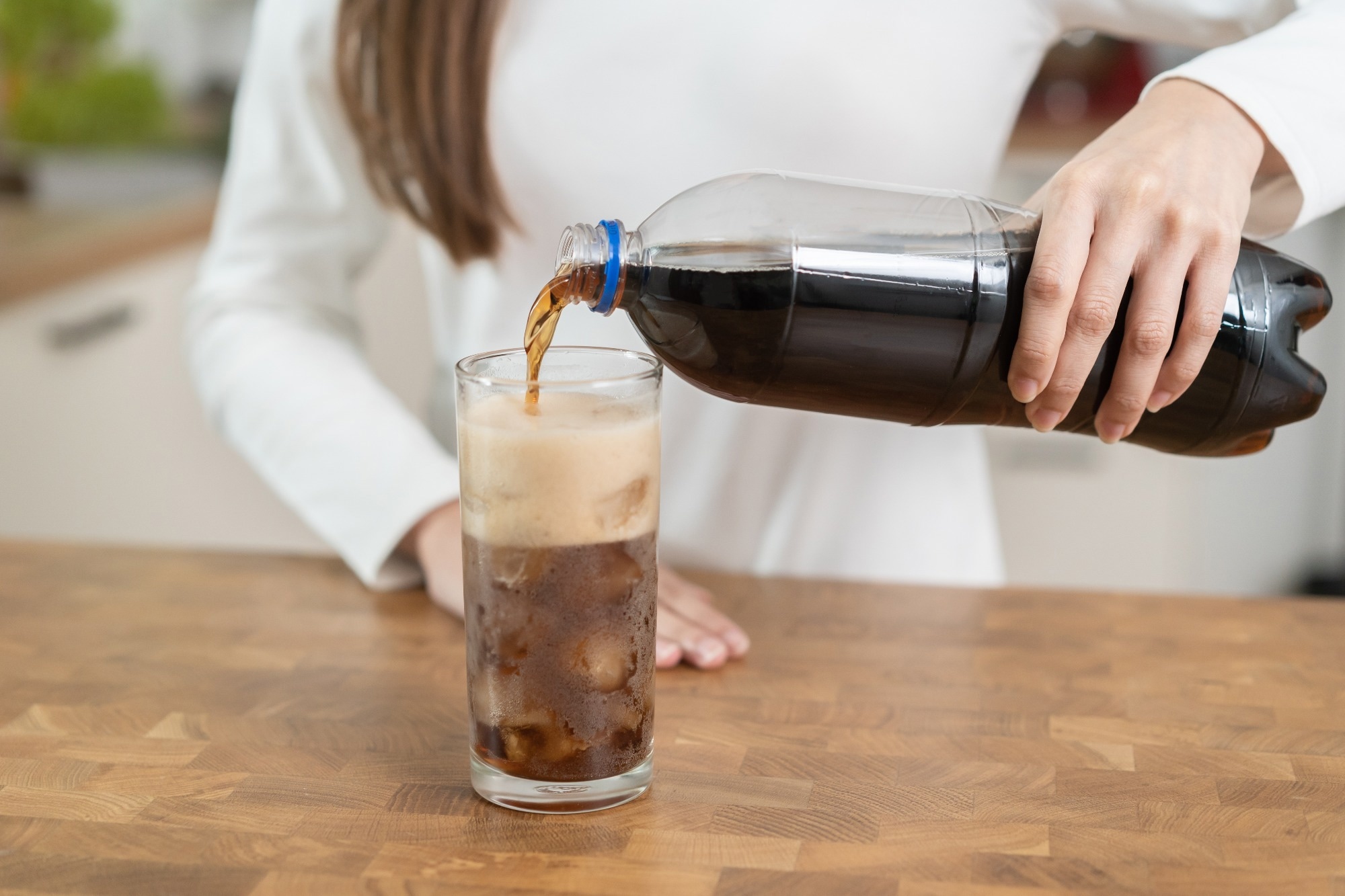Researchers have uncovered a surprising link between everyday soft drink habits and mental health, revealing that even moderate soda consumption could alter gut microbes in ways that heighten depression risk, especially among women.
 Study: Soft Drink Consumption and Depression Mediated by Gut Microbiome Alterations. Image credit: Kmpzzz/Shutterstock.com
Study: Soft Drink Consumption and Depression Mediated by Gut Microbiome Alterations. Image credit: Kmpzzz/Shutterstock.com
Consumption of soft drinks is linked to obesity, diabetes, heart disease, stroke, and cancer. They are also associated with increased rates of depression. A recent study published in JAMA Psychiatry examined how soft drinks were related to depression.
Introduction
Soft drinks are wildly popular worldwide, especially among children and teenagers. They are loaded with empty calories, mostly simple sugars like glucose and fructose, which push up blood glucose levels.
In addition, soft drinks present too much sugar for the intestine to absorb. Unabsorbed sugar promotes the proliferation of specific bacterial genera. These bacteria typically cause inflammation and reduce the integrity of the gut epithelium barrier. This weakens the mucosal immune system, keeping bacteria and bacterial products within the gut lumen.
The increased abundance of pro-inflammatory bacteria promotes systemic inflammation and neuroinflammation, which is linked to anxiety and learning deficits, especially among teenagers. Conversely, a diet that promotes the production of anti-inflammatory short-chain fatty acids (SCFAs) by ‘good’ gut bacteria protects the gut barrier and counters inflammation.
A higher soft drink intake is linked to an increased risk of depression, as shown by prior studies. Surprisingly, this is not true of high-sugar solid foods.
Research also shows that the gut microbiome is key to the development of major depression. Fecal microbiota transplants from depressed people can induce depressive-like symptoms in rodents. Several bacteria, like Atopium, Eggerthella, and Bifidobacterium, have been reported to be more abundant in major depression than healthy controls.
Further analysis has narrowed down the culprits to Eggerthella and Hungatella. Increased sugar in the gut may benefit Eggerthella by providing additional food. Eggerthella is a gram-positive anaerobic bacterium usually found at low levels in the healthy gut and associated with major depression. Its metabolic byproducts include acetate and arginine, and depressive symptoms are linked to higher acetate levels.
In mice, Eggerthella reduces the levels of the SCFA butyrate, causes immunosenescence (the age-related weakening of immunity), and reduces the levels of tryptophan, the precursor of the mood-regulating neurotransmitter serotonin.
About the study
The German study included a group of 405 patients diagnosed with major depressive disorder (MDD) and 527 healthy controls. The patients were drawn from the Marburg-Münster Affective Cohort, representing the general population. Both patients and controls were mostly female.
Multivariable regression and analysis of variance (ANOVA) models were used to identify associations between major depression, symptom severity, and soft drinks. Mediation analyses also explored the link between the gut microbes Eggerthella and Hungatella and soft drink consumption.
Study findings
Soft drink consumption predicted a higher rate of diagnosis of major depression. The odds of major depression were about 8% higher per unit increase in soft drink intake. People who drank more soft drinks were also more likely to have more severe depression.
These associations were driven by women participants, who had ~16% higher odds of major depression. In contrast, men failed to show any association.
Patients with depression had a higher mean body mass index (BMI) compared to controls. However, the observed pattern remained consistent even after adjusting for the BMI and for antidepressant use.
Interestingly, women who drank more soft drinks had a higher abundance of Eggerthella. An increase in Eggerthella abundance in female patients and controls partly mediated the association of depression with soft drink intake. About 4% and 5% of the association with depression diagnosis and severity, respectively, was caused by increased Eggerthella abundance.
BMI did not affect this association, which was not found in males. Moreover, the gut microbiome in women with depression was less diverse overall and showed less evenness of species distribution, with some species dominating the others. This was not seen with men.
This study is important in that it used a clinically diagnosed group of patients with depression, rather than including individuals who self-reported themselves as depressed. The authors noted that the observed effects were statistically small but may still be meaningful given how widely soft drinks are consumed. The effects attributable to soft drink consumption may be small but are easy to manipulate and wide-ranging in their reach.
These findings emphasize the need to educate consumers about the dangers of soft drinks to mental health. They also support policies restricting the marketing and availability of soft drinks since physical activity alone cannot compensate for soft drink intake.
Notably, moderate consumption, one or two soft drinks daily, has been associated with poorer health outcomes. These drinks should not be advertised to children, but support policies limiting soft drink availability. Taxation has reduced soft drink consumption and obesity rates in the UK. However, it has driven up the sales of artificially sweetened drinks, which were not separately analyzed in this study and may also warrant further research.
The reason for the predominantly female adverse effect of soft drinks remains unclear. Still, these findings highlight the need to interrupt the cycle of soft drink consumption and depression, especially since both impair normal metabolism. It is cautioned that the relationship might be bidirectional; people with depression could consume more soft drinks, so causality cannot be confirmed from this observational study.
Conclusion
“Education, prevention strategies, and policies aiming to reduce soft drink consumption are urgently required to mitigate depressive symptoms.”
Further interventions that alter the gut microbiome should also be tested. However, the authors emphasize that more research, including randomized trials, is needed to establish whether reducing soft drink intake can directly lower depression risk.
Download your PDF copy now!